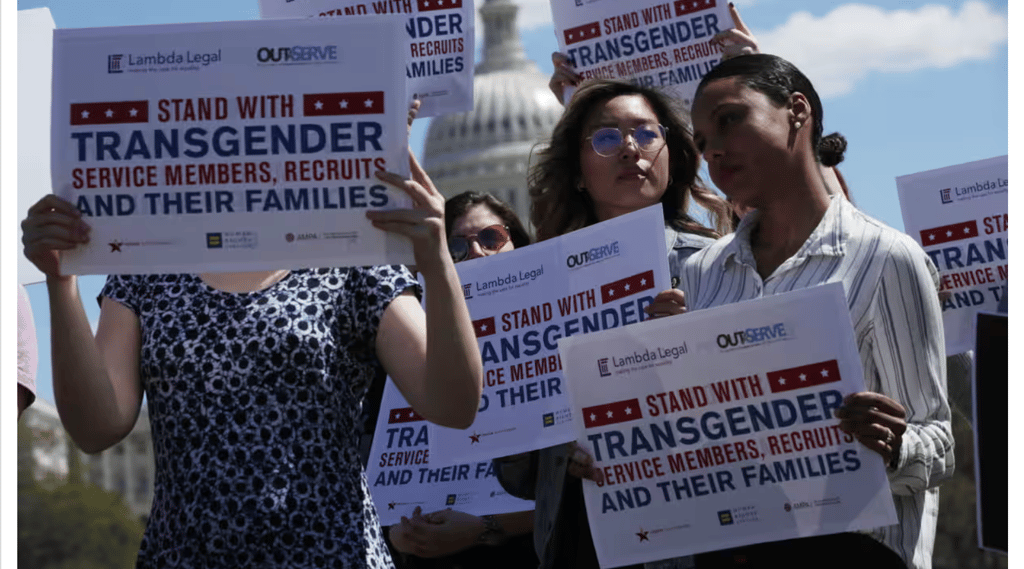Transgender Military Ban: Trump’s Push to the Supreme Court Sparks Constitutional Clash.
4/25/20254 min read


Transgender Military Ban: Trump’s Push to the Supreme Court Sparks Constitutional Clash.
In a move that has reignited a fierce debate over equality and military policy, the Trump administration is urging the U.S. Supreme Court to lift a nationwide injunction blocking its ban on transgender service members. This legal battle, rooted in questions of constitutional rights and military authority, pits the administration’s call for deference to military judgment against judicial rulings that demand evidence of harm to justify exclusion. As the case escalates, it’s a moment to unpack the stakes, the players, and what this means for transgender troops—and the nation.
The Backstory: A Policy Reversed and Challenged
The issue traces back to 2016, when the Obama administration allowed transgender individuals to serve openly in the military. During his first term, President Trump reversed this with a 2017 directive, claiming transgender service members undermined military readiness. That policy faced legal challenges and was partially implemented after a 2019 Supreme Court ruling allowed it to take effect while lawsuits continued. President Biden rescinded the ban in 2021, but Trump, back in office, issued a new executive order in January 2025, reinstating the prohibition. The order argues that transgender identity “conflicts with a soldier’s commitment to an honorable, truthful, and disciplined lifestyle” and harms military readiness.
This time, the policy hit immediate roadblocks. In March 2025, U.S. District Judge Benjamin Settle in Tacoma, Washington, issued a preliminary injunction, blocking the ban nationwide. Settle, a George W. Bush appointee, called the policy “unsupported, dramatic, and facially unfair,” noting the administration failed to provide evidence that transgender service members harm military effectiveness. He pointed to years of open service under Obama and Biden, where no data showed reduced readiness or cohesion. Similarly, in Washington, D.C., U.S. District Judge Ana Reyes issued another injunction, labeling the ban “soaked in animus” and a violation of equal protection rights under the Fifth Amendment
The Appeals Court Standoff
The Trump administration appealed both rulings. In the Washington state case, the San Francisco-based 9th U.S. Circuit Court of Appeals declined to pause Settle’s injunction, keeping the ban on hold. In the D.C. case, the U.S. Court of Appeals for the D.C. Circuit temporarily paused Reyes’ injunction but heard arguments on April 22, 2025, without signaling a clear ruling. Two of the three D.C. Circuit judges, appointed by Trump, asked few questions, leaving observers uncertain of their leanings.
The administration, represented by Solicitor General D. John Sauer, argues that courts should defer to the Pentagon’s “professional military judgments.” Sauer contends that the ban, based on a diagnosis of gender dysphoria, isn’t discriminatory but a necessary standard for military fitness, akin to restrictions on other medical conditions. The Defense Department claims 4,240 active-duty service members have gender dysphoria, a small fraction of the 1.3 million total force, but insists their presence risks “lethality and readiness.”
Opponents, including transgender service members and advocacy groups like Lambda Legal, counter that the ban violates constitutional guarantees of equal protection and lacks evidence. Plaintiffs, including decorated veterans like an Army major with a Bronze Star, argue the policy stigmatizes them as unfit despite exemplary service. Judge Settle emphasized that the government offered “no claim and no evidence” that individuals like Navy Cmdr. Emily Shilling, a plaintiff, harm their units.
The Supreme Court Showdown
Frustrated by lower court rulings, the Trump administration filed an emergency appeal with the Supreme Court on April 24, 2025, seeking to lift Settle’s injunction. Sauer argues that the district court’s order “usurps” the president’s authority to set military policy and ignores the deference owed to the Defense Department. The Court has asked plaintiffs to respond by May 1, signaling a fast-tracked review.
This isn’t the Supreme Court’s first encounter with the issue. In 2019, a 5-4 ruling allowed Trump’s earlier ban to proceed, with conservative justices prevailing. With today’s Court holding a 6-3 conservative majority, the administration may find a receptive audience. However, the lack of evidence supporting the ban could complicate matters, as justices like Neil Gorsuch have emphasized data-driven reasoning in past discrimination cases.
Why It Matters
For transgender service members—estimated at 4,200 to 15,000—the ban threatens careers and livelihoods. Plaintiffs include lifelong soldiers and recruits like Matthew Medina, who seeks to escape poverty through service. Beyond the military, the case tests broader questions of transgender rights, as Trump’s administration has also targeted gender-affirming care and sports participation.
For the nation, it’s a clash of principles: equality versus executive power. Should courts defer to military leaders, or demand proof that exclusion serves a legitimate purpose? The Supreme Court’s decision could reshape military policy and influence how constitutional protections apply to transgender Americans.
What’s Next?
As the Supreme Court weighs the case, expect heated arguments. The administration will lean on military deference, while opponents will highlight the ban’s lack of evidence and discriminatory intent. The outcome could hinge on whether justices see the policy as a rational military choice or an unconstitutional overreach.
This battle is more than legal—it’s personal. Transgender troops, many with decades of service, await a ruling that will define their place in the nation they serve. As the Court deliberates, the question remains: will evidence and equality prevail, or will deference to authority carry the day?
Thought-Provoking Questions for Readers:
1. Should the military have broad authority to set service standards, even without evidence of harm, or should courts require data to justify exclusionary policies?
2. How does the lack of evidence supporting the ban affect its legitimacy, especially when transgender troops have served openly without documented issues?
3. What role should the Supreme Court play in balancing military needs with constitutional protections for marginalized groups?
Activists participate in a rally in Washington DC against the transgender military service ban. Photograph: Alex Wong/Getty Images
hello@boncopia.com
+13286036419
© 2025. All rights reserved.